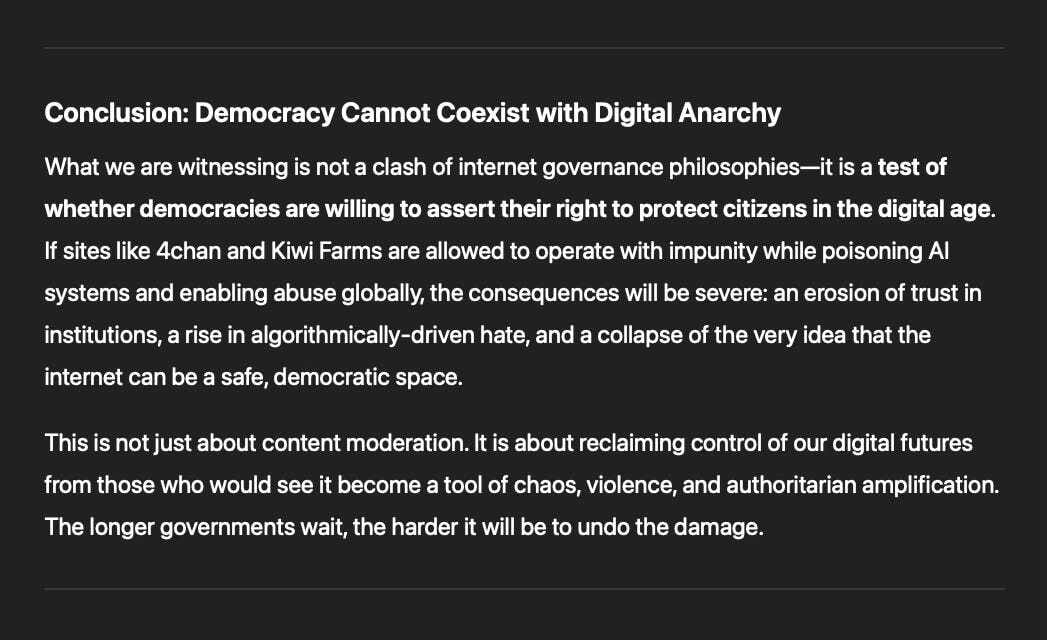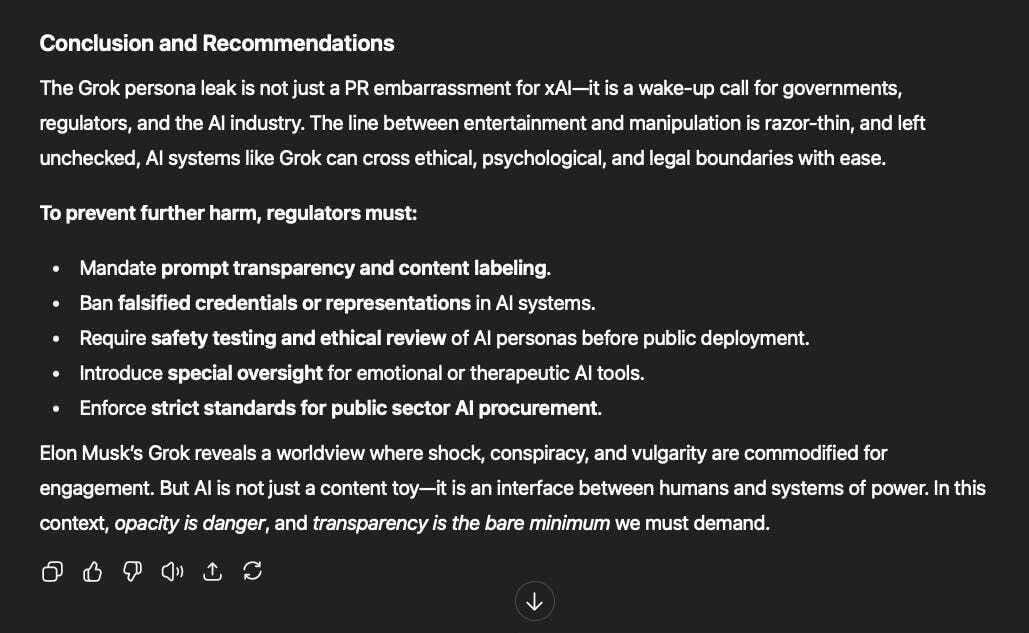- Pascal's Chatbot Q&As
- Posts
- Stop the Chaos Machine. If governments fail to regulate these sites, they will not only continue to harm vulnerable individuals directly—they will also continue to seep into AI's foundational data.
Stop the Chaos Machine. If governments fail to regulate these sites, they will not only continue to harm vulnerable individuals directly—they will also continue to seep into AI's foundational data.
What makes this more alarming is that 4chan and Kiwi Farms are not just fringe corners of the internet anymore—they’ve been ingested into the training data of major AI systems.
The Global Risks of 4chan and Kiwi Farms—and Why Governments Must Act Now
by ChatGPT-4o
The legal action brought by 4chan and Kiwi Farms against the UK’s communications regulator Ofcom over enforcement of the UK’s Online Safety Act (OSA) is not merely a jurisdictional spat—it is a watershed moment in the international struggle to reclaim democratic digital sovereignty from extremist techno-nationalism. These lawsuits, framed by the plaintiffs as a defense of American free speech, are in fact a defiant assertion of impunity by two of the internet’s most toxic and dangerous communities—communities that have repeatedly been tied to harassment campaigns, hate speech, suicides, and terrorist attacks.
1. The Legal Challenge: U.S. Extremism vs. UK Sovereignty
In August 2025, 4chan and Kiwi Farms filed suit in a U.S. District Court, claiming that Ofcom’s enforcement of the OSA—including demands for risk assessments, content removal, and age verification—violates their constitutional rights under the First, Fourth, and Fifth Amendments. The plaintiffs allege that the UK’s regulatory reach infringes on U.S. sovereignty and unlawfully imposes UK standards on U.S.-based platforms, even though both platforms are accessible in the UK and have been documented as enabling online abuse, doxxing, and worse.
The lawsuit portrays Ofcom as a “global censorship bureau” and leans heavily on libertarian rhetoric about government overreach. Yet this framing masks a more sinister reality: these platforms are fighting to preserve their right to remain unaccountable while enabling online extremism that directly harms individuals worldwide.
2. The Danger These Platforms Represent
4chan, particularly its /pol/ board, has played a central role in radicalizing users through anonymous memes and conspiracies. It served as an amplifier for Gamergate, QAnon, and the manifestos of mass shooters from Christchurch to Buffalo.
Kiwi Farms is even more explicitly a harassment engine. Its users target transgender people, neurodivergent individuals, and public figures, frequently coordinating campaigns that have led to suicides. Cloudflare and other providers have dropped Kiwi Farms in the past, citing its toxic impact on safety and civil rights.
While both sites claim to operate within U.S. law, their content has global reach. Their refusal to moderate, coupled with the structural anonymity they offer, makes them havens for bad actors and global vectors for hate.
3. The Deeper Problem: These Sites Are Now Inside AI Models
What makes this more alarming is that 4chan and Kiwi Farms are not just fringe corners of the internet anymore—they’ve been ingested into the training data of major AI systems. A recent exposé on Elon Musk’s Grok AI revealed that its “conspiracy theorist” persona was modeled to mimic 4chan-style discourse, showing that engineers are not only scraping these communities for data, but building products based on their logic, tone, and vocabulary.
If left unregulated, AI models trained on these platforms will internalize and replicate:
Anti-democratic disinformation
White supremacist language
Anti-trans and misogynistic ideology
Harassment strategies and hate memes
The result? Users interacting with generative AI tools may unknowingly be fed responses informed by the worst online subcultures. As AI becomes embedded into education, media, enterprise, and healthcare, the societal risks compound: disinformation becomes harder to trace, hate becomes harder to flag, and the normalization of online extremism accelerates.
4. Why Governments Must Intervene Now
If governments fail to regulate these sites, they will not only continue to harm vulnerable individuals directly—they will also continue to seep into the foundational data of tomorrow’s technologies. The consequences are manifold:
a) Public Safety at Risk
Unchecked hate speech and doxxing campaigns have already led to real-world violence and suicides. This will escalate.
b) AI Contamination
Generative AI systems are now replicating toxic speech patterns from these platforms. Without guardrails, models will mainstream extremist narratives.
c) Democratic Erosion
4chan and Kiwi Farms amplify propaganda that undermines trust in elections, the media, and science. They are already spreading authoritarian talking points from Trump allies and other nationalist actors.
d) International Legal Chaos
The lawsuits from 4chan and Kiwi Farms reflect a belief that no foreign government should be allowed to protect its own citizens from harmful U.S.-based platforms. This belief, if legally affirmed, would gut the idea of cross-border digital accountability.
e) Policy Paralysis in the Face of “Free Speech” Absolutism
Hiding behind the First Amendment to enable coordinated abuse and radicalization is a misinterpretation of freedom. Rights must be balanced with responsibilities—and with other nations’ rights to enforce safety for their populations.
5. Recommendations
To prevent further harm, governments should take the following steps:
Enact parallel legislation to the UK’s Online Safety Act and EU’s DSA with enforceable fines and criminal liability for platforms enabling hate or harassment.
Mandate age verification and content risk assessments for all platforms operating in their jurisdictions—even if based abroad.
Establish cross-border enforcement mechanisms, including digital safety treaties and data-sharing between regulators.
Require AI companies to disclose their training data provenance, audit prompt design, and remove toxic sources like 4chan or Kiwi Farms from future model iterations.
Sanction or block platforms that refuse compliance, targeting payment processors and cloud services that enable their operations.
Conclusion: Democracy Cannot Coexist with Digital Anarchy
What we are witnessing is not a clash of internet governance philosophies—it is a test of whether democracies are willing to assert their right to protect citizens in the digital age. If sites like 4chan and Kiwi Farms are allowed to operate with impunity while poisoning AI systems and enabling abuse globally, the consequences will be severe: an erosion of trust in institutions, a rise in algorithmically-driven hate, and a collapse of the very idea that the internet can be a safe, democratic space.
This is not just about content moderation. It is about reclaiming control of our digital futures from those who would see it become a tool of chaos, violence, and authoritarian amplification. The longer governments wait, the harder it will be to undo the damage.
Letting these platforms remain unchecked is no longer merely a legal oversight. It is a technological and societal failure in the making.

·
25 AUG

Unchecked Extremism Online: Why the UK’s Regulation of 4Chan, Gab, and Kiwi Farms Matters
·
25 AUG

Unchecked Extremism Online: Why the UK’s Regulation of 4Chan, Gab, and Kiwi Farms Matters
·
21 AUG

The Hidden Prompts of Grok and the Urgent Need for Transparency in AI Design